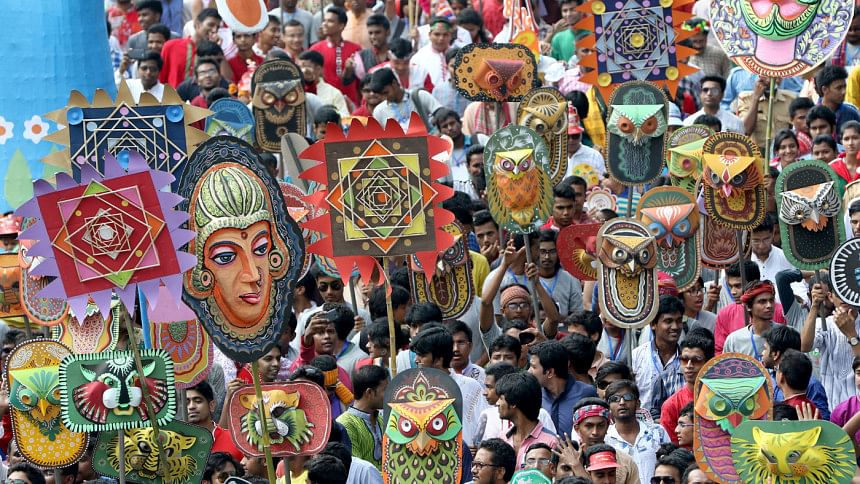Charukola’s Mangal Shobhajatra celebration goes online!

Celebrations for Pohela Boishakh in the country have come to a sudden halt, due to concerns over the coronavirus pandemic. Yet, communities are set to welcome the Bengali New Year 1427 on April 14, with beautiful arrangements.
For students and teachers of University of Dhaka's Faculty of Fine Art (popularly known as Charukola), the beginning of April is usually a busy time, as the campus premises bustle with preparations for the Mangal Shobhajatra rally to usher in the Bengali New Year.
The Mangal Shobhajatra Research and Expansion Centre has urged people to celebrate Pohela Boishakh at their homes. Eminent artist Syed Abul Barq Alvi, the president of the centre, has asked all artists to engage in the benevolent service of ensuring people's safety.
"Individual artists and organisations can take the initiative of making masks, crowns, traditional art pieces, posters, banners, festoons and dresses at their households," said Abul Barq Alvi. "They can also encourage others to learn the techniques of creating these things online. With the support of social and online media, artists, educational institutions and cultural organisations can celebrate the Mangal Shobhajatra in creative ways, while staying safe at their homes."
Professor Nisar Hossain, Dean of the Faculty of Fine Art, DU, mentioned that every year, Syed Azizul Haque, eminent art theorist, researcher and a professor at the Department of Bangla, DU, usually helps them to decide the celebration theme. "We generally reveal the theme only on the poster. As this year's celebration is different, we inserted a few more text quotes on the poster to suit the celebration's spirit," said Nisar Hossain.
Syed Azizul Haque suggested incorporating Ernest Hemingway's famous quotes, "But man is not made for defeat. A man can be destroyed but not defeated." (from the novel The Old Man and the Sea) and excerpts, 'Mukto Koro Bhoy, Aapona Maajhe Shokti Dhoro Nijere Koro Joy' from Rabindranath Tagore's famous song, Sankocher Biwhalata, on the poster.
Mangal Shobhajatra was inscribed on UNESCO's Representative List of Intangible Cultural Heritage of Humanity in 2016, on Pohela Boishakh. It is a vibrant and colourful procession, in which tens of thousands of people from all walks of life join, as part of their celebration of the Bangla New Year.
In 1989, the artists organised a colourful procession titled 'Mangal Shobhajatra' --meaning wellbeing procession -- on Pohela Boishakh. Since then, the students and teachers of Charukola have been in the forefront of organising Mangal Shobhajatra, every year. Eminent artists Syed Abul Barq Alvi, Professor Nisar Hossain, Professor Shishir Bhattacharjee and Saidul Haque Juise, among others, brought out the first colourful procession of Mangal Shobhajatra. It has now become an integral part of the Pohela Boishakh celebration. Mangal Shobhajatra generally features various animal-shaped carnival floats, large colourful masks, replicas of birds, butterflies, traditional dolls, kings, queens, fish and other motifs of Bangladeshi culture.
The Mangal Shobhajatra festival symbolises the pride the people of Bangladesh have in their folk heritage, their strength and courage to fight against sinister forces, and their vindication of truth and justice. It also represents solidarity and a shared value for democracy, uniting people, irrespective of caste, creed, religion, gender or age.

 For all latest news, follow The Daily Star's Google News channel.
For all latest news, follow The Daily Star's Google News channel. 



Comments